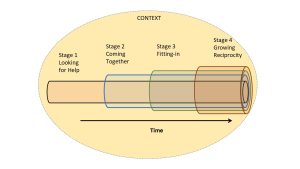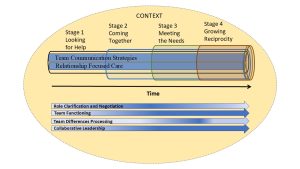8 Collaborative Relationship-Building
Learning about the six competency domains equips you to know how you can contribute to building collaborative relationships within a team. Relationships are foundational to collaboration as illustrated below in the Interprofessional Collaborative Relationship-Building (ICRB) model.
The Interprofessional Collaborative Relationship-Building (ICRB) Model
The ICRB model (Figure 1) focuses on how collaborative relationships develop over time between health professionals and persons such as patients and families. The model is intended to help people locate, situate and set direction for teams to work on their relationships.
Figure 1. The Interprofessional Collaborative Relationship-Building (ICRB) Model

Wener & Woodgate, 2016; Wener et al., 2022.
Collaborative relationship-building and the CIHC competencies
Figure 2 illustrates how at all stages of relationship development, being focused on the relationships and the communication strategies is critical. However, other competency domains while always important, are anticipated to be prioritized at certain stages. For example, at the beginning of the relationship, once providers recognize they need help/collaboration with others, role clarification and negotiation will be important as well as collaborative leadership.
Figure 2. The Interprofessional Collaborative Relationship-Building Model and the CIHC Competency Framework


